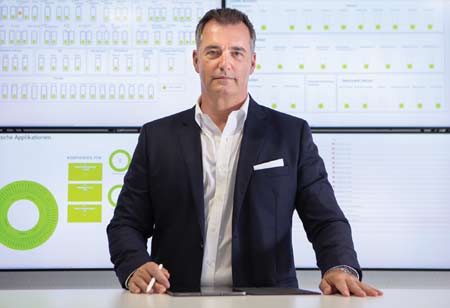Thank you for Subscribing to Healthcare Business Review Weekly Brief

Transforming Healthcare: Merging Passion, Technology, and Patient-Centric Innovation
Healthcare Business Review
Alex Nelles is a customer-centric C-Level Executive with 24+ years of experience in Telco, Healthcare, Retail, and Travel. As CIO at Kantonsspital Winterthur, he leads digital transformation, leveraging his fluency in "Business" and "Tech" to create strategic solutions that create value. Alex is passionate about enhancing quality and competitive advantage through technology and loves turning ideas into real-world advantages.
From Aspiring Healer to Tech Innovator
When I was a little boy, my Grandma used to ask me what job I wanted to do when I grew up. I told her I wanted to be a doctor so I could make her healthy again when she was old. Years later, I realized my dream wasn't really about medicine. It was about wanting to help people. I wanted to make their lives better. I ended up becoming a businessperson with a strong passion for technology. Ever since then, I've used my business skills and tech knowledge to help make life easier for others. I believe that technology should make our lives easier, and I keep trying to find ways to make this happen.
I have worked in Telecommunications, Retail, Travel, and now in Healthcare. While I often hear that having extensive industry experience is crucial, being an outsider has been an advantage. In digital transformation, although industry experience is valuable, diverse experience can be a real game-changer. Bringing in talent from various sectors introduces fresh perspectives, innovative ideas, and adaptable problem-solving skills that drive success beyond traditional industry boundaries.
Prioritizing Patient Experience for Effective Healthcare Digital Transformation
The short answer: It’s not about tech - it’s about people. Here’s the thing: if we plant Customer Experience, we will harvest Process Efficiency. Many people ask me what the main focus of a Digital Transformation Strategy should be. In the past, it was all about automating, cutting the workforce, and reducing costs - end of story. But I believe the real game-changer is focusing on the patient path. Creating great patient experiences is like planting seeds for success. It’s not just about making things nice; it’s about ensuring simplicity, consistency, and reliability. This requires efficient, well-tuned processes that keep everything running smoothly, elevate customer satisfaction, and drive overall efficiency.
Innovating Admin Tasks to Enhance Patient Care and Maintain Personal Touch
When you need to see a doctor or visit a hospital, everyone wants to feel cared for. It’s about the human touch that builds trust and assures you that you'll feel taken care of. However, today, doctors spend up to 50% of their time on administrative tasks. Nurses and other staff also spend a lot of time handling paperwork, like collecting insurance or other general information from patients. We need to give healthcare professionals more time to focus on patients - that's why they chose this job in the first place.
Generative AI And Other Advancements Are Opening Up Possibilities I Never Imagined. I Foresee Digital Assistants Helping Us Make Personalized Decisions Based On Individual Data - From Wearables To Regular Health Check-Ups
This is why we focus on innovating administrative processes at patient touchpoints while maintaining a high level of patient experience through newly introduced digital channels. We drive adoption rates by making these channels as easy as possible for patients to use, freeing up time for healthcare professionals to engage more in essential interactions with their patients.
Leveraging AI to Prevent Illness and Transform Care
While improvements in healthcare have increased life expectancy, we’re struggling to finance the system. As the number of patients with multiple chronic conditions rises, we’re turning to digital transformation to boost efficiency across the sector. However, given the speed at which we can implement these changes, I’m not convinced it will be fast enough or sufficient on its own. We need to think differently. What if we could reduce the number of people needing medical support by preventing sickness in the first place?
Generative AI and other advancements are opening up possibilities I never imagined. I foresee digital assistants helping us make personalized decisions based on individual data - from wearables to regular health check-ups. Longevity studies are already showing us ways to maintain and improve our health, but today’s medical focus is largely on detecting disease and finding the best therapy. I believe technology can help us to shift this perspective to proactive health management. A specifically trained AI assistant, regularly fed with personal data, can provide personalized advice to adjust our behavior or take specific actions, helping us stay healthy and ultimately reducing the demand on the healthcare system.
Climbing the IT Ladder: Simplify, Strategize, and Build Winning Teams
Key learnings I have learned from great people I met during my career:
• Prioritize Simplicity: Success in digital transformation comes from simplifying processes and challenging outdated rules. Focus on making things more efficient, not more complex, to enable effective automation and digital enhancements.
• Be Strategic, Not Just Digital: Digitalization should solve real challenges, not just digitize for the sake of it. Understand your pain points first, then implement the best solutions to improve processes, efficiency, and patient experiences.
• Lead with Strategy: As a leader, you’re a key strategic player. Leverage your expertise in technology and business processes to drive innovation and value, positioning Technology at the heart of organizational success.
• Focus on Building High-Performing Teams: Develop diverse, high-performing teams that foster trust, accountability, and collaboration. Invest in your team’s growth and cultivate a culture that drives success.









